___________________________________________
Choosing the correct type of metal detector is very vital. One area of importance to be considered is the Pulse Induction (PI) that have an effect on overall performance.
Take a look at the article below for further clarification.
First and foremost, you want to find a metal detector that is already known to be very good for finding nuggets of gold. A great many detectors are for multi use purposes, and some of these might not be the best choice for your intended purpose, in mineralized areas. You really need to steer clear of the old BFO and TR detectors since these now are the detectors of the past. In recent years, massive advances have been achieved with regards to the technology of metal detectors. Ideally, you want to purchase a good VLF or a PI detector to gain good results. On the market today there are at the very least a dozen or more great gold metal detectors and your budget will likely have a play in which one is best for you.
Certainly in mineralized areas strongly consider the pulse induction, PI detectors. Now, as regards accessories, there are many on the market that can aid you vastly as you search for your ideal and suitable gold detector. If you pick the right ones these can greatly increase your gold metal detectors overall performance. One must have, is a good set of high impedance headphones. If at all possible, what you want to try and do is to match the impedance of the headphones to your actual gold detector. You will find that some work great with some detectors, whilst on others, the results will not be so good.
Another worthwhile accessory is an audio booster or signal enhancer which will help to increase faint target sounds, but be aware also that these can increase the background noise whilst you are out in the field conducting your gold metal detecting.
Nearly all detector manufacturers produce a variety of search coils, i.e. the round device that you move just above the surface of the ground and/or terrain. These can vary in size and also in configuration (DD, DD pro, Mono and Salt). As a general rule of thumb, the smaller circumference loops work best for tighter areas and smaller gold which is close to the surface. Larger coils have the advantage of allowing you to cover more ground, although they have less sensitivity to smaller pieces of gold, the advantage with these though is the depth to which they can detect gold nuggets lower down or deeper, this does depend though as I said on the size of the coil and the target. Recent advances have made some detectors very advanced pieces of equipment in their own right and there are now some very good ones on the market, the MineLab 4500 springs to mind straightaway if you have the budget for this one.
You will also need a decent digger, often called a prospecting pick, this will enhance your digging speed considerably. Consider first a lightweight pick as the less weight you need to cart around the more ground you can cover at the end of the day. A metal handle or a wooden handle makes little difference, just make sure if the latter that the handle is not going to snap on you at the worst possible time, unexpectantly as this can be rather infuriating and time consuming should it happen to you.
Acquiring a super strong magnet is also very helpful in area that have a lot of iron trash. A strong good sized magnet will save you so much time when digging in an area where there is lots of iron rubbish.
By Mark P Andrews
Mark P Andrews is the co-owner of GoldsGold.com http://www.GoldsGold.com - Where you can find a great number of gold metal detectors available for sale at down to earth prices. You will find on the website, just about every conceivable item of equipment required for successful gold prospecting, even gold claims, gold bars, gold nuggets and for the home prospector, paydirt as well that you can pan in your own garden or yard. Check out the website rightaway: http://www.GoldsGold.com
Article Source: http://EzineArticles.com/?expert=Mark_P_Andrews


No comments:
Post a Comment